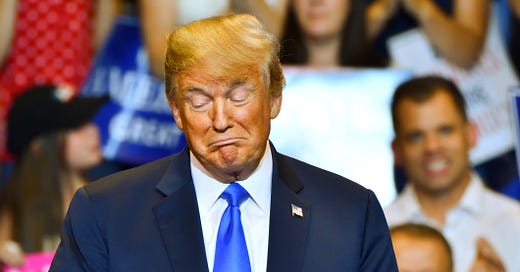Trump Could Win the Looming Porn Star Case. Why Is He Instigating Violence?
It's simple, he believes he's above the rule of law
Donald Trump will soon be indicted. Rather than face the prospect of losing he has, as he did after the 2020 election, sought to summon a mob, this time to forestall accountability for his conduct. If he succeeds now where he failed before it will be a significant blow to the American conception of justice and the rule of law.
The indictment may be this week in New York where Trump faces allegations that he falsified records related to hush money he paid to porn star Stormy Daniels to stop her from disclosing their sexual connection to the public. If not, it may be in the next few weeks in Georgia where the allegation is that he tried to steal the election by asking state officials to “find” him over 11,000 votes. And thereafter Trump may be indicted in federal court, either for concealing classified documents at Mar-a-Lago and then obstructing justice by lying about what he had done or for his role as the instigator of the insurrection on Jan. 6th. But he will be indicted—quite possibly more than once. Of that there is little doubt.
And so we meet Trump Agonistes—a besieged Samson-like figure engaged in a public showdown with mighty political opponents trying to maintain his freedom and legacy by waging a war by any means necessary, including destroying the rule of law. Nor is Trump waging merely a metaphorical war.
Summoning the Mob
Predicting his own arrest in the Daniels case in Manhattan, Trump called on his supporters to “PROTEST, TAKE OUR NATION BACK!” Doubling down, he then summoned them in another Truth Social post: “WE MUST SAVE AMERICA! PROTEST, PROTEST, PROTEST!!!” Later he said: “OUR COUNTRY IS BEING DESTROYED, AS THEY TELL US TO BE PEACEFUL!” (Caps original) And now he is warning of “death and destruction” if the Manhattan district attorney, “a degenerate psychopath that truly hates America”, charges him with a crime.
In asking his supporters to protest against his arrest, he is not simply asking for their moral support. He is making thinly veiled calls to violence. He is implicitly declaring, “The laws do not apply to me because I can summon the mob to protect me.” A MAGA mob threatened members of Congress when they considered his impeachment, and now Trump is pointing it at prosecutors. And as the case against him proceeds, he may well point it at judges and jurors. In short, he is making a bid for total impunity from the law.
But in the seeming strength of Trump’s call to the violent mob there is a strong whiff of weakness. Indeed, Trump’s reaction to the multiple prospective indictments against him makes him look more like a struggling fish caught on the hook. To try to stave off the New York indictment, as I’ve noted, he is trying to gin up protests. Meanwhile, in Georgia, his attorneys have filed an egregiously premature challenge to the special grand jury, hoping to prevent an indictment that has yet to come. Neither effort is likely to succeed in the long run. And the attempt to cow the investigating District Attorneys in Manhattan and Fulton County, Georgia, make Trump seem fearful and desperate.
Many argue that the Manhattan case is small potatoes compared to the impending charges for the retention of national security secrets and then obstructing efforts to recover them or the attempted theft of an election. It is true that paying off a porn start to conceal an affair, though loathsome and tawdry, is less important than the other two actions. But failure to charge Trump in this case simply because he has made himself invulnerable through his notoriety would be tantamount to giving him special treatment.
Trump versus the Rule of Law
Be that as it may, the better case against the New York indictment is that it is on weaker legal grounds given that it relies on the testimony of Michael Cohen, a convicted felon, and a relatively novel—and untested—legal theory under New York law. Although some analysts are more sanguine about the merits of the case, my own sense is that because the facts of the case are relatively undisputed, Trump will try to make the trial about the motivations of his “persecutors” and their “witch hunt” of him. Given how well that claim resonates with Trump’s supporters, it is likely that he will find at least one sympathetic juror who would vote to acquit. That’s all it’ll take—one person to buy Trump’s vision of himself as the victim of a vengeful prosecutor, searching for even a trivial crime—for him to get off.
Which raises the following question: If Trump can likely avoid punishment in this rather trivial and arguably shaky legal case, why doesn’t he go to trial, win an acquittal (or at least avoid a conviction) and see that justice is done? The answer is that Trump doesn’t believe the rule of law applies to him. Even though he could, quite possibly, win his case in court (and thus strengthen his position in the court of public opinion) he has chosen instead to summon the mob—precisely because he sees himself as too special for regular rules.
Trump’s response to the New York indictment is a trial run. If he can derail justice there, the tactics will benefit him in other cases where the evidence against him is stronger and the nature of his alleged crimes much more significant.
Indeed, the biggest news of the past week was not the prospect of Trump’s indictment in New York but something else altogether: A federal judge, Beryl Howell, ordered Trump’s attorney, Evan Corcoran, to testify before a federal grand jury in Washington about the classified documents found at Mar-a-Lago and turn over all the notes of his conversations with Trump to federal prosecutors.
To understand the magnitude of Judge Howell’s decision, one must understand how important the attorney-client privilege is for lawyers. Without it, it would be impossible for clients to be totally candid with their attorneys and map out an effective legal strategy. It is fundamental to the legal profession and so judges are extremely reluctant to weaken it.
Indeed, they override it only in the rarest of circumstances when either: a) the lawyer himself participated in a crime or b) when a client uses the legal advice and services obtained to commit a crime—the so-called “crime-fraud exception. “
That’s the exception that Judge Howell is invoking in this case. At issue is the letter that Corcoran wrote to the Department of Justice in response to its subpoena asking for all the classified documents in Trump’s possession. Corcoran asserted in it that a “diligent search” of Trump’s properties had found merely three-dozen or so documents, which he handed back. But the subsequent FBI raid of Mar-a-Lago discovered loads more. So the court is trying to determine whether Corcoran lied to the government or, more likely, whether Trump deliberately misled his own lawyer to prevent federal authorities from recovering these documents, either of which would be a crime.
Multiple Transgressions Require Multiple Lawsuits
The proceedings and Corcoran’s grand jury testimony remain sealed and cloaked in secrecy. But it is hard to imagine that the judge would have taken such a drastic step unless she believed there was strong evidence that in fact Trump had committed a crime. To be clear, the judge’s determination that there is sufficient evidence to invoke the “crime-fraud exception” does not mean that the “proof beyond a reasonable doubt” standard to obtain a criminal conviction has been met. But it does mean that there is likely enough evidence to support a presentation to the grand jury for an indictment.
Even more strikingly, this is not the only instance when the crime-fraud exception has been invoked against Trump. Another federal judge did so in March 2022 in the broader case involving Trump’s acts in fomenting the Jan. 6th rebellion and seeking to prevent the certification of Biden’s victory. And in the Georgia elections case a special grand jury has already recommended multiple indictments tied to the probe into Trump’s attempt to influence the election. Even if Trump considers the New York case to be minor, he must, when faced with these other three investigations, be contemplating the very real prospect of prosecution and a possible conviction.
Trump is pointing to these investigations as evidence of “overreach” and a witch-hunt. But that’s nonsense. Trump’s pervasive criminality requires multiple investigations for the rule of law to protect itself from his assaults.
For years, Trump has wanted the world to think of him as Thanos—the inevitable victor in any public contest. But in reality, he is Trump Agonistes—struggling to escape the consequences of his own actions that are demanded under the rule of law. Trump’s ominous calls to violence simultaneously signal that he believes that he is above the law—and express his fear that he may not be.
© The UnPopulist 2023
Follow The UnPopulist on: X, Threads, YouTube, TikTok, Facebook, Instagram, and Bluesky.







It is not about "saving America" but about abolishing the USA as a democracy and the rule of law polity. The "savior" rhetoric and behaviors of Trump supporters are similar to those of criminal, militant, and cult organizations.
Religion is all about controlling what others see and hear and making sure other's perceptions line up with your own. In faith, you don't need to worry about what the other side is doing. You worry about what YOU YOURSELF are doing and correct things within yourself. Rather than malign Trump or 'the other party', successful, honest organizations find faults within themselves and correct those things. It's time to stop with the partisanship. It's destroying everything. The left have made some horrible errors lately including electing a president who can't even walk a straight line or tie his own shoe laces. Does anyone really believe he's in power? This has made the US the laughing stock of the world. The Emperor has no clothes. How about some articles on how the Left can improve themselves.